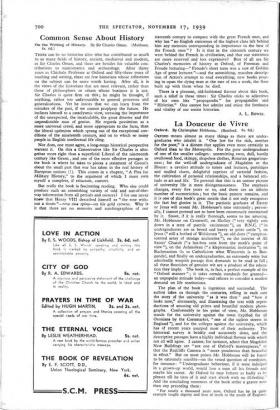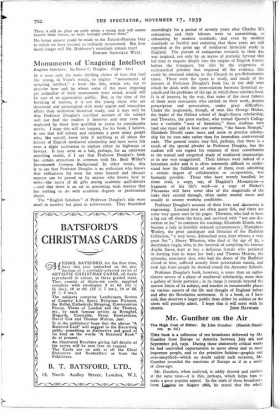La Douceur de Vivre
Oxford. By Christopher Hobhoust.. (Batsford. 8s. 6d.)
OXFORD means almost as many things as there are under-
graduates who inhabit it. "One law for the rich, another for the poor," is a dictum that applies even more certainly to
Oxford than to the Metropolis. For the poor undergraduate of one of the smaller colleges: unremitting swot, dull, hastily swallowed food, skimpy, shapeless clothes, Rotarian gregarious- ness ; for the well-off undergraduate of Magdalen or the House: a cavalier attitude to tutors and lectures, partridges and mulled claret, delightful caprices of sartorial fashion, the cultivation of personal relationships, and a balanced atti- tude to art and life. To pretend that this is an untrue picture of university life is mere disingenuousness. The emphasis changes, every five years or so, and there are an infinite number of eccentricities ; but the basic pattern remains, and it is one of this book's great merits that it not only recognises the fact but glories in it. The patriotic graduate of Exeter or Jesus will resent Mr. Hobhouse's tone extremely ; person- ally, I cannot pretend not to have been enormously entertained by it. Snoot, if it is really thorough, seems to me amusing. Mr. Hobhouse on Cromwell, on Shelley (" very rightly sent down in a state of puerile excitement "), on B.N.C. (" its undergraduates are as broad and heavy as prize cattle "), on Jesus (" still a hotbed of Welshmen "), on old dons (" camphor- scented array of strange anchorites "), on the interior of All Saints' Church (" a hat-box seen from the moth's point of view "), on the Ashmolean (" a kleptomaniac institution "), on Buchmanism (is to Catholicism what Wincarnis is to Bur- gundy), and finally on undergraduettes, an extremely witty but admittedly waspish passage that demands to be read in full ; all these flourishes of genuine wit are a product of the educa- tion they imply. The book is, in fact, a perfect example of the " Oxford manner " ; it takes certain standards for granted— an unpopular attitude today—and refuses to consider a modest demand on life meritorious.
The plan of the book is ingenious and successful. The author takes us through the centuries, telling in each case the story of the university " as it was then " and " how it looks now," alternately, and illustrating the text with repro- ductions of amusing old prints and beautiful modem photo- graphs. Conformably to his point of view, Mr. Hobhouse stands for the university against the town (typified for all Oxonians by the Cornmarket, " one of the ugliest streets in England "), and for the colleges against the university, which has of recent years usurped most of their authority. The historical survey is briskly and accurately done, and the descriptive passages have a highly individual flavour with which not all will agree. I cannot, for instance, admit that Magdalen New Buildings are " not one of Oxford's masterpieces," or that the Radcliffe Camera is " more ponderous than beautiful in effect." But on most points Mr. Hobhouse will be found to be extremely sensible—on the vexed question of rowdyism, for instance : " Undergraduate behaviour, if it were indulged in a grown-up world, would lose a man all his friends and maybe his career. At Oxford he may behave as badly as he pleases till he tires of it and start afresh with no ill-feeling." And the concluding sentences of the book strike a graver note than any preceding them :
" For nearly a thousand years now, Oxford has by its quiet example taught dignity and love of truth to the youth of England. There is still no place on earth where a young man will sooner acquire these virtues, or more lastingly embrace them."
No better answer could be made to the Fascist-Marxian bray to which we have become so tediously accustomed. But how much longer will Mr. Hobhouse's exordium remain true?
EDWARD SACKVILLE WEST.





































































 Previous page
Previous page